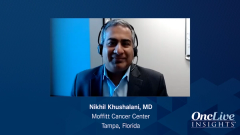
Meaningful End Points for Patients with Metastatic Melanoma
Experts on skin cancer discuss valuable end points for determining successful treatments for patients with metastatic melanoma.
Episodes in this series

Transcript:
Sunandana Chandra, MD, MS: We’ve talked a lot about different trials that led to the FDA approval of some of these agents. What are some of the more meaningful end points? Overall survival is a gold standard, but in many of our trials we don’t have that data yet or we’re not [statistically] powered to be able to show that as a primary end point. Can you comment on some meaningful end points for this metastatic patient population? Dr Pavlick?
Anna C. Pavlick, DO: That’s a very intriguing question. Many times patients will have responses; however, they won’t be complete responses [CRs]. You’ll still have radiographic evidence of what we don’t know is real disease or not real disease, so you have to look at those patients who have stable disease and can go on to have stable disease for very long periods of time. Ultimately, overall survival is the bottom line, but progression-free survival is also a very important factor. You can have complete responders and feel much more comfortable knowing that someone who has complete resolution of disease on their imaging is doing well, but if you can follow someone with sequential scans over the years and their disease never changes, that’s very meaningful.
Nikhil Khushalani, MD: I agree. The other end point that is very meaningful for the metastatic patients is complete response rate because I do believe, at least with immunotherapy, that CR rates in this disease eventually equate or serve as a surrogate for long-term disease control. If we have regimens that have a higher complete response rate, those are regimens that I’d try to favor using up front. That’s one approach.
The other thing that I’ve become more tuned to looking at in our patients is their treatment-free interval after their frontline therapy. That’s important for a variety of reasons: quality of life, toxicity assessments, financial toxicity issues. The longer patients can be off treatment after a successful frontline therapy, that’s a very meaningful end point for designing some of our newer trials as well.
Finally, duration of treatment is important. Whether that’s necessarily an end point, we should investigate. Some of the older paradigms were 24 months of therapy, and then some of the newer trials went on for 1 year of therapy. But there’s no scientific logic in my mind that says that’s the amount of time you need. Therefore, we use a shorter duration of time, particularly for patients who’ve achieved the CR and have had at least 6 months of therapy. I’d be very comfortable stopping their treatment in the setting of immunotherapy but not for targeted therapy.
Transcript edited for clarity.






































